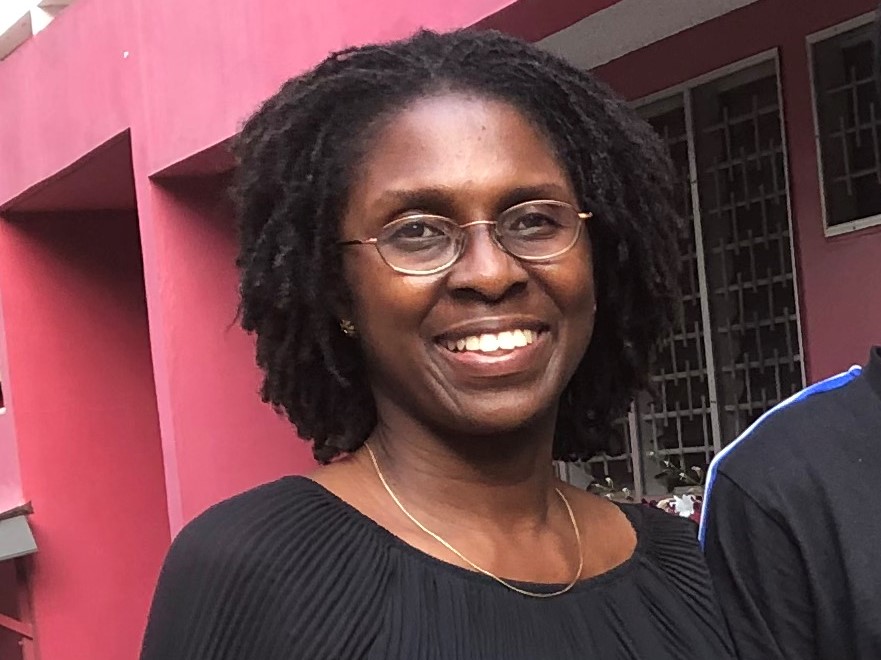
08 Jun Sally-Ann Ohene successfully defends her thesis on “Assessing components of TB care cascade in Ghana”
On 29 April, Dr. Sally-ann Ohene successfully defended her thesis titled “Assessing components of TB care cascade in Ghana.” Her doctoral research aimed to investigate aspects of the Tuberculosis (TB) care pathway; including how to make use of existing structures in Ghana’s healthcare system to find more Tuberculosis (TB) cases. Various aspects of the TB care cascade continue to be under-researched and remain a very important research area not only for AIGHD but for international global health objectives as well.
The “TB Cascade” refers to the process of firstly identifying TB cases, secondly testing to confirm TB cases, thirdly initiating treatment for those confirmed to have TB, and lastly monitoring to ensure successful treatment. It occurred to Dr. Sally-Ann that in Ghana “we report about 14,000-15,000 TB cases every year. But the actual numbers are in the range of 44,000. So, my thesis looks at ways of identifying more TB cases and also assessing how under-researched groups such as extrapulmonary TB patients and children with TB fare on TB treatment.” Dr. Sally-Ann has been working in the WHO country office in Ghana and was responsible for HIV and TB care at a point. One of her colleagues introduced her to Prof. Paul Klatser—her soon-to-be supervisor—and she began her doctoral shortly after. Before this, as an HIV and TB officer for WHO, she supported a Canadian International Development Agency funded TB-case-finding project.
In her research project, Sally-Ann investigated the effectiveness of screening for more TB cases. She particularly focused on the screening of people who came to hospitals for other illnesses, as well as pre-emptively screening HIV and diabetic patients at their review clinics, contacts of those with TB, and mining communities as these populations are at a higher risk for contracting TB. Many of these mining communities are hard to reach and often operate illegally. Extrapulmonary TB cases affect areas outside the lungs such as the bones or the brain, however, little is known about how well they do on treatment in Ghana. Lastly, not much has been done to study the treatment outcomes for children with TB, therefore Dr. Sally-Ann needed to produce answers for this gap in research.
For Dr. Sally-Ann, making sure more TB cases could be found at no or little extra cost was of utmost importance in a resource-limited setting like Ghana. For example, Sally-Ann wanted to observe if existing healthcare workers could screen for common TB symptoms in patients visiting hospitals for other illnesses. Furthermore, before a patient begins treatment, health staff visits their home to verify where they stay for future follow-up in case the patient does not show up for treatment. When health staff conducts these home visits, they can conduct TB screening of a patient’s immediate contacts to check if any of them could have TB. Through a combination of different screening methods, screenings at HIV and diabetes clinics, and contact tracing, Sally-Ann’s research was able to show that TB cases could be found harnessing the existing structures. For those with extrapulmonary TB and children with TB, their treatment could be improved if TB and HIV services were more user-friendly.
The most rewarding aspect of Dr. Sally-Ann’s research journey was the opportunity to examine different aspects of TB among different groups of people and to learn different lessons from the TB care cascade. She enjoyed being able to use a public health perspective to look at ways to preemptively lower the risk of TB transmission within communities in Ghana. Although her research took a while because she was balancing a full-time job alongside her doctoral degree, Dr. Sally-Ann is incredibly grateful for the support of her supervisors Prof. Paul Klatser and Mirjam Bakker. She says that “they just didn’t give up on me and I am very grateful for this opportunity.” AIGHD’s Prof. Frank Cobelens was part of Sally-Ann’s promotional committee as well.
As for the future, Dr. Sally-Ann is looking forward to sharing this information. She says, “with a Ph.D. you can look at academia, build upon research, and disseminate findings. I look forward to sharing this information and I think people can really learn from this.” We congratulate her on her Ph.D. and wish Sally-Ann the best of luck in her future endeavors!
